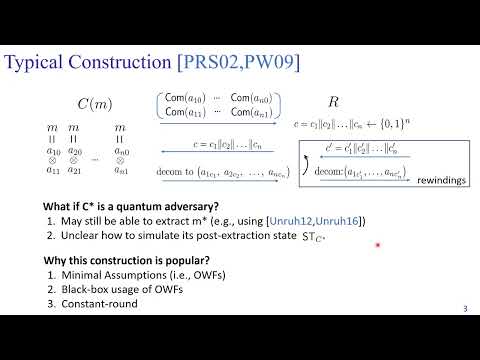CryptoDB
Post-Quantum Simulatable Extraction with Minimal Assumptions: Black-Box and Constant-Round
| Authors: |
|
|---|---|
| Download: | |
| Presentation: | Slides |
| Conference: | CRYPTO 2022 |
| Abstract: | From the minimal assumption of post-quantum semi-honest oblivious transfers, we build the first $\epsilon$-simulatable two-party computation (2PC) against quantum polynomial-time (QPT) adversaries that is both constant-round and black-box (for both the construction and security reduction). A recent work by Chia, Chung, Liu, and Yamakawa (FOCS'21) shows that post-quantum 2PC with standard simulation-based security is impossible in constant rounds, unless either $NP \subseteq BQP$ or relying on non-black-box simulation. The $\epsilon$-simulatability we target is a relaxation of the standard simulation-based security that allows for an arbitrarily small noticeable simulation error $\epsilon$. Moreover, when quantum communication is allowed, we can further weaken the assumption to post-quantum secure one-way functions (PQ-OWFs), while maintaining the constant-round and black-box property. Our techniques also yield the following set of constant-round and black-box two-party protocols secure against QPT adversaries, only assuming black-box access to PQ-OWFs: - extractable commitments for which the extractor is also an $\epsilon$-simulator; - $\epsilon$-zero-knowledge commit-and-prove whose commit stage is extractable with $\epsilon$-simulation; - $\epsilon$-simulatable coin-flipping; - $\epsilon$-zero-knowledge arguments of knowledge for $NP$ for which the knowledge extractor is also an $\epsilon$-simulator; - $\epsilon$-zero-knowledge arguments for $QMA$. At the heart of the above results is a black-box extraction lemma showing how to efficiently extract secrets from QPT adversaries while disturbing their quantum state in a controllable manner, i.e., achieving $\epsilon$-simulatability of the after-extraction state of the adversary. |
Video from CRYPTO 2022
BibTeX
@inproceedings{crypto-2022-32142,
title={Post-Quantum Simulatable Extraction with Minimal Assumptions: Black-Box and Constant-Round},
publisher={Springer-Verlag},
author={Nai-Hui Chia and Kai-Min Chung and Xiao Liang and Takashi Yamakawa},
year=2022
}

